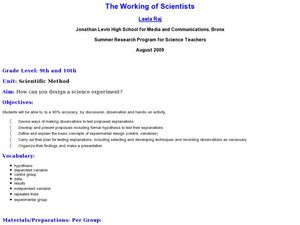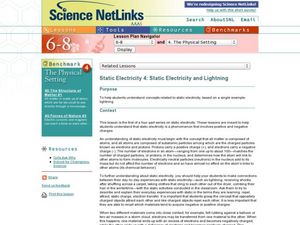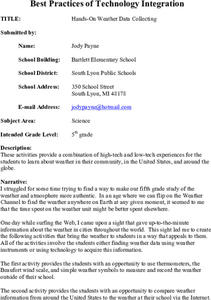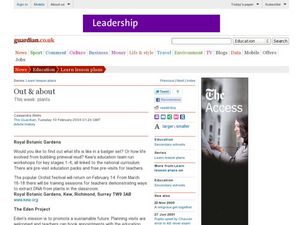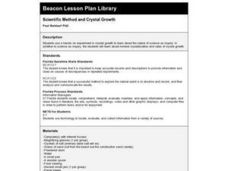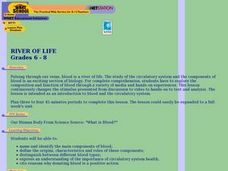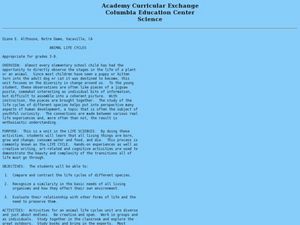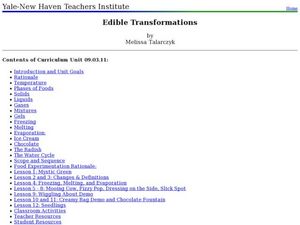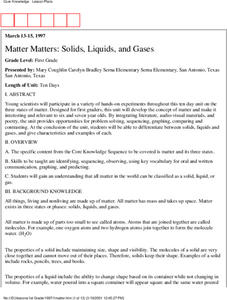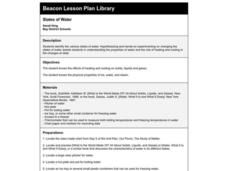Smithsonian Institution
Trait Tracker
Help mice beat the odds with an exciting activity about traits. Biologists discover the role of diet and other factors on animal traits by participating in a simulation activity. Teams collect and evaluate data to understand how certain...
Curated OER
"Eggs-perimenting" Fun
Students dissolve salt into water, place an egg into a glass of salt water, observe and record observations, make a scientific hypothesis, summarize what they studied from this hands-on experiment. They share their ideas and findings...
Curated OER
The Working of Scientists
Students define and explain the basic concepts of experimental design. In this scientific method lesson students complete a hands on activity, develop and present proposals to test their explanations.
Curated OER
Hands On Biodiversity: Networking Students and Their Biomes
Students telecommunicate and use the US Mail to network students from five biomes in the United States in order to monitor water quality in each area. They have e-mail pals and exchange materials representative of themselves and their...
Curated OER
Amazing Water Changes
Pupils explore the properties of water and how it changes states. In this kindergarten to 2nd grade science instructional activity, students pair a hands-on science activity with two suggested books. This inquiry...
Curated OER
Hands-On Weather Data Collecting
Fifth graders use Internet sites to complete a study of weather and atmosphere. They compare weather data from cities around the world. They use thermometers, the Beaufort wind scale, and simple weather symbols to measure weather around...
Curated OER
Water 1: Water and Ice
Students explore forms that water can take and examine the water cycle. In this hands-on science lesson, students participate in activities that require them to change water to a solid and back to a liquid again.
Curated OER
Swords, Arrows, and Eggs
Students enjoy hands-on learning experiences. In this current events lesson, students may visit the Lulworth Castle, Roald Dahl Museum, Glasgow Science Centre, Salts Mill, or the Sherwood Forest online or in-person to discover details of...
Curated OER
Are We There Yet?
Students make their way to British museums. In this field trip opportunities lesson, students visit the The Deep, the Science of Sport, the Castle Munster, or High Beeches online on in person to experience hands-on science instruction.
Curated OER
Out and About: Plants
Students examine plants. For this hands-on science lesson, students visit the Royal Botanic Gardens, the Eden Project, and Nature's World online or in person to investigate plants and gardens.
Curated OER
Visualizing the Greenhouse Effect and Global Warming
Students discover the differences between global warming and the greenhouse effect through hands-on classroom experiences. They use a 2-D globe and picture cards to identify the causes of both. Students visualize the human influence on...
Curated OER
Scientific Method and Crystal Growth
Learners conduct a hands-on experiment growing crystals to demonstrate the nature of science as inquiry. They discuss and test variables that affect crystal growth. They research mineral crystallization and mineral formation on the...
Curated OER
River of Life
Students explore the composition and function of blood through a variety of media and hands-on experiences. This lesson is a very good introduction to blood and the circulatory system.
Curated OER
Environment: The River Classroom
Seventh graders engage in hands-on experiments and activities dealing with rivers and greenways. They also observe lectures and demonstrations by experts in water and river restoration. Students and teachers participate in canoe trips...
Curated OER
Making Your Dog Your Best Friend
Students delve into dog training. In this biology lesson plan, students learn that hands, voice and heart is the basis of dog training and through demonstration and take part in a hands-on experience to teach a dog simple commands and to...
Curated OER
Animal Life Cycle
Students conduct hands-on experiments. In this life cycle lesson, students are able to observe a variety of animals as they travel through their life cycle (brine shrimp, mealworms, frog eggs and chicken eggs). Students respond to what...
Curated OER
Edible Transformations
Learners differentiate the different phases of matter. In this chemistry lesson, students conduct several hands-on exercises to discover how matter transforms when mixed together. They identify the different stages in the water cycle.
Curated OER
It's Rainin', It's Pouring
Students take a quick examine part of the water cycle, and the combined gas laws. The lesson lead them through the conditions necessary for cloud formation and allow them to create clouds in three different hands-on activities.
Curated OER
Simple Machines: Levers
Students discover the fundamentals and daily applications of simple machines. They practice basic engineering theory through their hands-on demonstrations of levers.
Curated OER
How Does Evolution Work?
Students investigate how natural selection influences evolution. They complete a hands-on lab simulation of natural selection, and replicate a real experiment and examine the interplay between selection factors in a population of guppies.
Curated OER
The Water Planet
Learners use NASA photographs and hands-on activities to compare the amounts of land and water on our planet. They discover that the world has five oceans and that they cover seventy percent of Earth's surface. Students learn how this...
Curated OER
Weight A Minute
Students watch a video and engage in hands-on activities which introduce scientific information made real through re-cognition and understanding the phenomena of gravitational force and how it impacts life on our planet.
Curated OER
Matter Matters: Solids, Liquids and Gases
Scientists participate in a variety of hands-on experiments in this ten-day unit on the three states of matter. Lessons incorporate literature, a-v materials, and poetry to help students differentiate between solids, liquids and gases.
Curated OER
STATES OF WATER
Students identify the various states of water. They use hypothesizing and hands-on experimenting on changing the states of water, the properties of water, and the role of heating and cooling in the changes of state.


